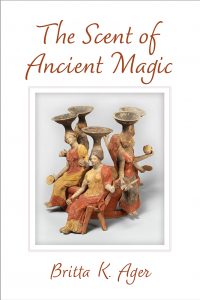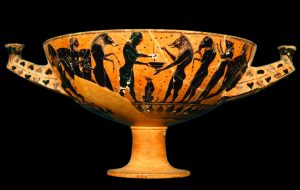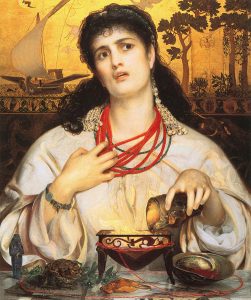Q&A with “The Scent of Ancient Magic” Author, Britta Ager

This guest author post is a Q&A with Britta K. Ager, author of The Scent of Ancient Magic from the University of Michigan Press. This book is available in hardcover and accessible ebook formats.
The Scent of Ancient Magic explores the connection between scent and magic in the Greco-Roman world. Why was scent so important to these ancient rituals?
Humans have a tendency to connect smells and magic. After all, we imagine magic as something which is invisible and intangible, but also powerful, and that’s also true of scent. You can’t see smells, but they can affect you profoundly—a smell can have physical effects, like making you hungry or nauseated, and smells are notoriously powerful at evoking memories and emotions. You catch the scent of lilacs and remember a school trip to the park one spring, or stale coffee evokes a college road trip years before and a half-forgotten friend. Scent is ephemeral for something which has such a surprising effect on us, and it seems to act as a familiar, gut-level model for how humans imagine similarly invisible supernatural forces to act. Human cultures worldwide have seen scent and magic as connected in various ways.
Ancient magicians were aware of the effects of strong smells on both their bodies and their minds, and they used scent liberally in their rituals to mark out ritual space and time as special and different from everyday life. They use incenses that remind them of Greek, Roman, and Egyptian temple practices which they would have experienced, highlighting the sacred aspects of their rites; they used overpowering scents to put themselves into altered states of consciousness, in which they were more receptive to believing that their rituals were working.
What smells could someone expect throughout these rituals?
All sorts of scents, both good and bad! Ritual practitioners used pleasant spicy and floral smells the most often, in a wide variety of forms: they burned incenses, poured perfume oils, wore and carried fresh branches and flowers of scented plants, burned fragrant woods like cedar and thyine or made their ritual implements from them, chewed spices to perfume their breath, wore amulets made from whole spices around their necks, filled their lamps with perfumed oils, and even wrote spell words with scented inks. Frankincense and myrrh were especially common, as were floral perfumes like rose and lily. But many of the incenses magicians used were complex blends made from many different aromatic ingredients. The surviving ancient spellbooks give recipes for these, so that the magician would have exactly the right scent for the ritual they were performing. Bad smells were also important. If nice incenses weren’t getting the attention of the gods, there were also bad-smelling “coercive” incenses, made with ingredients like dead mice, animal droppings, vinegar, and garlic. Burning a coercive incense could supposedly force the gods to do what you wanted.
I’ve actually tried making one of the normal incenses and one of the coercive incenses myself. The normal incense was really pleasant; it was a complex sweet, gently spicy odor which I’d be happy to surround myself with. The coercive incense, though, was one of the most disgusting things I’ve ever smelled.
What did witches smell like in Greek and Roman literature?
We can recover a lot of what real ancient magicians did, but when we look at ancient imaginary literature like the Odyssey , we move into the realm of the fantastic. Real magicians seem to have been men more often than women, although we hear about women too; but in the imaginative literature of antiquity magic users are more often women, and these witches embody ancient fears of women having power. There’s a sharp cultural divide in how they smell: Greek witches tend to be young, beautiful, and nice smelling, while Roman witches are often old, ugly, and foul smelling. Both types, though, use magic potions, ointments, and herbs which smell fragrant, often like perfume. In literature, witches like Medea often use these sweet-smelling spells to muddle people’s minds, confusing them, enchanting them, or putting them to sleep, and this echoes more ordinary fears of the way women could supposedly “entrap” men with perfumes and cosmetics against their better judgment.
Who or what could these spells affect? Were ordinary, everyday people a part of these rituals, or were these practices closed?
Magic was in widespread use throughout the ancient world. The preserved spellbooks tend to show us more elaborate spells which required the user to be highly literate and to have the money for expensive ingredients and the leisure and privacy for elaborate rituals: these are relatively well-off and educated practitioners. However, we also hear about much simpler spells which required very little time or investment: for example, a farmer could keep storms from damaging their crops by burying a toad in a pot in the middle of the field, or a radish worn around someone’s neck on a piece of string was a simple amulet to ward off disease. We also know that many people went to professional magicians for help. For a fee, you could have an expert write out a curse for you even if you were illiterate yourself. Some curses written on lead sheets have even been discovered pre-made, with blanks left for the name of the person to be cursed; all the magician had to do was fill them in when a client came.
What do you hope readers will take away from reading The Scent of Ancient Magic?
My fundamental point is that magic and scent were connected in the ancient world, in ways which can sometimes be very complicated and sometimes very straightforward. It’s easy to look at an ancient coercive incense meant to force the moon goddess Selene to do your will and to think, wow, this is weird and alien; why did anyone think this worked? But when we start looking at our own behavior in the modern world, we aren’t really all that different: we treat perfumes as tools of sexual attraction, regard mint-scented things as especially medicinal, and burn lavender candles to help us fall asleep. That same gut-level belief that scented things are powerful is still there for us, just like it was for the ancients.






